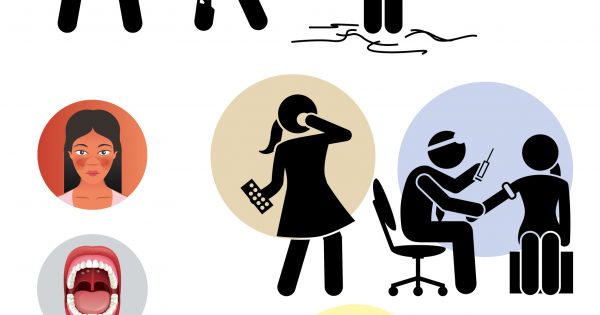Preventable diseases like pneumonia, meningitis and diarrhoea caused two-thirds of childhood deaths worldwide in 2010. With vaccination, these unnecessary deaths could have been avoided, yet many parents still harbour doubts on whether their children should be vaccinated.
Their worries include the possibility that their children could have adverse reactions, side effects, or even fall sick because of the vaccine. There are many controversies surrounding vaccines, with many fanciful claims to confuse parents.
How vaccines work
Your child’s body naturally produces cells and antibodies to help protect against viruses and bacteria. However, these defense mechanisms can be overwhelmed. Vaccines contain small amounts of weakened or dead viruses, bacteria, or parts of either; vaccination works by stimulating the body to fight them, thus strengthening immunity by priming the defense cells to recognise the particular virus or bacteria so that they can better fight it in the future.
Benefits of vaccination
Vaccination has been successfully proven to control and even eliminate diseases. It even protects the people who come into contact with the vaccinated person by preventing the spread of diseases. Vaccination pre-empts the mental and physical trauma of suffering a disease and enduring its complications.
It is crucial that you take this issue seriously and ensure your child receives his/her vaccines in the National Immunisation Programme (NIP) as well as the other recommended vaccines at the appropriate ages.
Success stories
Thanks to vaccination, previously rampant diseases have been eradicated or almost so. These include:
- Smallpox: Completely eradicated worldwide in 1979.
- Polio: In 1978, 120 cases were recorded, but by 1992, the figure dropped to only 4 cases that were imported from other countries. There have been zero cases from 2010 onwards.
- Diphtheria: In 1976, 250 cases were recorded, but by 2007, there were zero cases.
- Pertussis: The amount of cases from 1975 to 2008 dropped by over 90%. However, waning immunity and the need for adult pertussis vaccination has led to its reappearance.
Misconceptions about vaccinations and vaccines
- Vaccines cause side effects, diseases, death or long-term side effects
Vaccines are safe. Some children may have minor effects after vaccination, such as a sore arm or mild fever, but adverse effects occur very rarely. A continuous surveillance done by the Centre for Disease Control and Prevention (CDC) in the U.S. shows little or no evidence that the deaths reported to the Vaccine Adverse Event Reporting System (VAERS) were due to vaccines.* - Giving a child multiple vaccines for different illnesses at once can overburden the immune system
Combination vaccines will not be too much of a burden for children’s immune systems. Research has shown that children’s immune systems are able to cope with even more antigens than those contained in combination vaccines. Besides, the child is exposed to bacteria and virus everyday. - Some diseases have already disappeared, so there is no need for my child to get vaccinated
Certain diseases are rare in our country due to effective compulsory vaccination. However, family or friends who travel to countries where these diseases still exist might unknowingly bring these diseases back. Having your child vaccinated helps prevent him/her from catching these diseases. As smallpox has been eradicated, the vaccination was discontinued.
Vaccine controversies: are they true?
- MMR (measles, mumps, rubella) vaccine causes autism and bowel disease
The link between MMR and autism is completely baseless!In 1998, British researcher Dr Andrew Wakefield published a paper in the medical journal The Lancet, claiming a link between the MMR vaccine and the development of autism and bowel disease. This paper has since been discredited by many experts as it was based on a small case series with no controls that linked three common conditions, and relied on parental recall and beliefs. Journalist Brian Deer subsequently showed evidence that Wakefield falsified patients’ medical histories in order to support his claim of discovering a new syndrome.
The Lancet has since withdrawn the article, but this paper was responsible for causing a measles outbreak in the UK which resulted in deaths.
- Polio vaccine causes paralysis
Reports of polio vaccines causing vaccine-associated paralytic polio (VAPP) have been on-going for many years, but despite the hype, actual occurrences are very, very rare. The Malaysian NIP changed from oral to the injected inactivated polio vaccine (IPV) in 2009, which does not cause VAPP. - Polio vaccine and infertility
This baseless claim originated in African nations to prevent the use of oral polio vaccine (OPV) among the African Muslim community. This has negatively impacted efforts to reduce polio in African countries, Pakistan, and Afghanistan – the last area where polio still exists.
Vaccination is a hassle-free and cost-effective method of primary prevention for children. Compared to the risks of vaccinations, the complications of actually suffering vaccine-preventable diseases are much worse. If your children have yet to be vaccinated, get it done now! Don’t neglect booster shots, as they must be completed in order to effectively protect your child.
* CDC continuous surveillance between 1990 and 1992







Comments